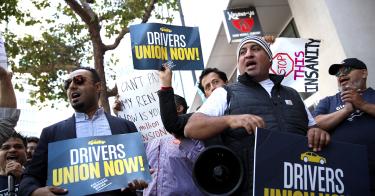Most gig workers love being their own bosses. But California lawmakers want to change that.
They’ve passed Assembly Bill 5 which creates a three-part, “ABC” test that would make it extremely difficult for anyone to act as an independent worker, instead of an employee. This will affect more than gig-economy workers, like Uber drivers or those who pick up odd jobs through Task Rabbit. It also applies to contract-based jobs like janitors, construction workers, and security guards. Only wealthier contractors, such as insurance brokers, realtors, and health care providers, receive a pass under the bill, and therefore can keep their jobs and their autonomy.
According to tax-administration data, self-employment or independent work increased about 30 percent between 2000 and 2014. That includes millions of workers who are part of the so-called “gig-economy.”
The most obvious appeal of gig-economy jobs is the ability to “be your own boss.” Gig-economy workers can choose when they work, how long they work, and often where they work. If money is tight, they can pick up additional jobs, and if they want to take a vacation, they don’t need to get a boss’s permission.
California’s new law, ostensibly passed to “protect” these workers, would effectively end all that,
Consider Uber.
If it’s significantly more costly for companies to treat workers as employees, how many drivers will the company have to lay off? Will it have to require drivers to work at least 20 hours per week, during prescribed shifts? Will they require cameras in drivers’ cars to monitor their work? Will Uber have to provide the cars to “protect” working conditions? All these changes would significantly increase prices and reduce ride availability for Uber customers.
But even drivers (and gig workers in general) won’t come out ahead, because the so-called “protections” will actually be constraints that cut jobs and incomes. That’s because the more flexible that work is, the more hours people work.
According to a recent economic analysis, Uber’s fully-flexible platform causes drivers to work 16.1 hours more per week than if they had to commit to a monthly, taxi-cab type schedule. In fact, the average Uber driver would not work at all under such constraints.
As a working mom, I totally get this. If I had to punch a clock and conform to whatever schedule my employer prescribed, I would probably not work at all. I suspect that’s true for other parents as well.
For many, however, not working isn’t an option. So after AB5 becomes law, what does the single mom do if she can’t find an employer willing to let her work on a schedule that accommodates her kids’ needs? What about the disabled person who can’t work every day, but who can drive for Uber on days he feels good, or the college student who drives to help pay tuition? And what about contract-based jobs such as janitors and construction workers? These aren’t quite the same as gig-economy jobs, they serve an important function that is unique from formal employment.
For many businesses, it makes sense to contract for janitorial services. But the nature of janitorial work is better suited to task-based payments, as opposed to hourly work. It would be extremely difficult for a company that sends janitors to 50 different locations to track each workers’ hours and exercise control over their work environments.
Or, consider small home-builders who cannot provide full-time employment to all the workers—concrete pourers, framers, electricians, etc.—needed to build a home. It makes more sense for those workers to partner with multiple builders who can provide higher and more stable income.
California’s bill will also close job and income opportunities for underemployed workers who often use temporary and contract-based work to keep food on the table while looking for full-time employment. And often times, those temporary and contract-based jobs turn into full-time employment, with the benefit of workers and companies being able to test it out before committing to formal employment.
By putting a gag on the gig economy and driving out contract-based employment opportunities, California lawmaker’s attempt to “protect” workers will instead leave Californians with fewer jobs, lower incomes, and a smaller economy.
This piece originally appeared in The Orange County Register



